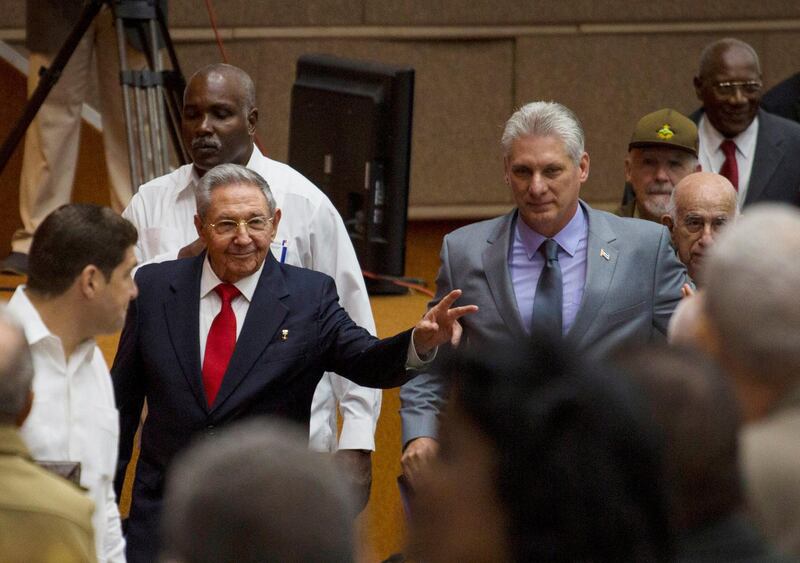The Castro brothers’ six-decade grip on power in Cuba approached its end on Wednesday as the country’s National Assembly named number two Miguel Diaz-Canel as the sole candidate for the presidency.
Mr Diaz-Canel, a 57-year-old Communist Party official and the first vice president, is due to be confirmed on Thursday as the successor to Raul Castro, who himself succeeded his elder brother Fidel.
On Wednesday, the National Assembly opened a historic two-day meeting to elect a successor to the 86-year-old Mr Castro, to mark a new era in the Caribbean island nation's history.
“On behalf of the National Nominating Committee, I have the responsibility and honor to propose to you comrade Miguel Mario Diaz-Canel Bermudez as President of the Council of State and Ministers of the Republic of Cuba,” commission president Gisela Duarte told the Assembly, effectively ending any suspense over the identity of Cuba’s new leader.
_______________
Read more:
[ Cuba brings forward assembly session to pick new president ]
_______________
Since last year, Mr Diaz-Canel has been expected to take over from Mr Castro, who made it clear his deputy was his personal choice.
He will become the island’s first leader born after the 1959 revolution not named Castro.
On Wednesday, the two men appeared smiling at the opening of the Assembly's inaugural session that was elected last month.
Castro and the assembled MPs warmly applauded Mr Duarte’s announcement of his protege as the sole candidate.
Since the 1959 revolution, when Fidel Castro seized power on the Caribbean island, Cubans have only known one handover of power. Fidel, stricken by illness, passed the baton to Raul in 2006.
Once formally named president in 2008, Raul embarked on a series of once unthinkable reforms, including the opening up of economy to small private entrepreneurs and, more remarkable still, a rapprochement with its Cold War arch-enemy, the United States.
In 2015, the two countries renewed diplomatic ties, and the following year, then president Barack Obama paid a historic visit to the island.
However, normalisation has been curtailed since the arrival of President Donald Trump in the White House last year.
The silver-haired Mr Diaz-Canel has spent decades climbing the party ranks, becoming Castro’s right-hand man in 2013.
Mr Diaz-Canel will be tasked with continuing the economic reforms introduced by Mr Castro, and inherits a youthful population hungry for change on the Caribbean island that has been a staunch outpost of Communism since the collapse of the Soviet Union.
Cuba watchers and domestic analysts say he will favor continuity over change in the early days of his presidency, however.
Though he has often been portrayed as a moderate, a video of a private meeting with Communist Party members released last year showed him lashing out at Cuban dissidents and the US in a tirade worthy of the most ruthless hardliner.
At its two-day meeting, the 605-seat National Assembly is to vote in a new Council of State, which counts 31 members and whose head will automatically become president.
Although the session was planned for Thursday, officials decided earlier this week to extend it across two days "to facilitate the procedures during an event of such significance."
The session is closed to the press and no details have been given about the programme.
Although the vote could take place on Wednesday, the new president’s name is not expected to be made public until Thursday, which is April 19 – a date heavy with symbolism.
It falls on the 57th anniversary of the Bay of Pigs invasion in 1961, when the CIA tried to overthrow the leader of the 1959 revolution, Fidel Castro – an episode Havana has long proclaimed as American imperialism’s first great defeat in Latin America.






